|
|
|
Sort Order |
|
|
|
Items / Page
|
|
|
|
|
|
|
| Srl | Item |
| 1 |
ID:
116559
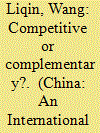

|
|
|
|
|
| Publication |
2012.
|
| Summary/Abstract |
China proposed the establishing of the China-ASEAN Free Trade Area (CAFTA) in 2001, indicating a shift in the focus of its trade policy from the international level, as reflected by its efforts to enter the World Trade Organization, to the regional level. The establishment of the CAFTA resulted in a substantial increase in trade value and substantive changes in trade structure between China and the Association of Southeast Asian Nations. Detailed studies of the revealed comparative advantage index for machinery and transport equipment, manufacturing goods and food and live animals categories reveal that China has played an increasingly complementary role in trade cooperation with ASEAN in the 2000s.
|
|
|
|
|
|
|
|
|
|
|
|
|
|
|
|
| 2 |
ID:
160937


|
|
|
|
|
| Summary/Abstract |
Since the Cold War, South-East Asia has been marked by a period of relative calm and stability. Yet this peace belies ongoing tensions, mistrust and stress in the Association of Southeast Asian Nations (ASEAN) and among its member states. Within the scholarship on ASEAN, not enough attention is devoted to these underlying currents. How and in what way do tensions stress the ASEAN norms? What are some of the coping mechanisms adopted by ASEAN and its member states? Engaging with the scholarship on norms, the author contends that changes wrought in this relationship are both extra- and intra-mural. These have accelerated as contentious issues—particularly the South China Sea disputes—gain more visibility. The author argues that ASEAN is put under pressure, firstly, through a more muscular Chinese foreign policy that disrupts but does not yet break the fundamental norms of ASEAN and, secondly, through internal contestation over ASEAN norms that challenges the meaning of these norms. Essentially, the article gives an account of how internal and external pressures are burdening ASEAN norms but yet remain durable because of resistance against duress by the bloc and member states. This is done through an examination of instances where the established order and practices in the region were disturbed, and the response to this disturbance.
|
|
|
|
|
|
|
|
|
|
|
|
|
|
|
|
| 3 |
ID:
086255
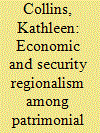

|
|
|
|
|
| Publication |
2009.
|
| Summary/Abstract |
The 'new regionalism' has spread to Central Asia; yet there has been little success in implementing most regional initiatives there. Security regionalism has had greater success than economic regionalism, even though economic initiatives would bring great benefits to the economy and population. I propose a connection between patrimonialism and regionalism. Central Asia's patrimonial leaders are driven by survival and personal enrichment, and are beholden to informal vested interests. Since economic regionalism involves liberalisation that adversely affects these actors, the result is 'virtual' economic regionalism at best. In the case of security regionalism, some regional organisations progress because they bolster patrimonial regimes, with negative consequences for democracy.
|
|
|
|
|
|
|
|
|
|
|
|
|
|
|
|
| 4 |
ID:
131572
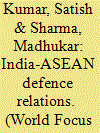

|
|
|
|
|
| Publication |
2014.
|
| Summary/Abstract |
Since the early 1990s, India steadily expanded its defence cooperation with the Southeast Asian nations, both bilaterally and multilaterally. But defence cooperation was by no means the priority for India or the ASEAN. Despite the many calls on India to play a larger role in Asia, India has been rather hesitant in articulating a grand strategy for its Asian policy. Unlike China where the strategic community and the government have shown great self-consciousness of Beijing's rise and articulated a clear set of regional goals, India has been relatively mute.
|
|
|
|
|
|
|
|
|
|
|
|
|
|
|
|
| 5 |
ID:
123008
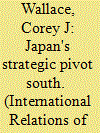

|
|
|
|
|
| Publication |
2013.
|
| Summary/Abstract |
Tensions between Japan and its neighbors pose a significant problem for the viability of Japan's strategic 'dual hedge' between China and the United States. Japan's response has been to embrace renewed US commitment to the region while initiating comprehensive strategic partnerships in military, economic, and political spheres with nations 'south' of its traditional domain of strategic interest. Strengthened relationships with Southeast Asian nations, India, and Australia may turn out to be crucial for Japan as it will enable Japan to manage its security affairs without having to depart from its long-cultivated maritime security policy, and will enable Japan to continue to pursue a neo-mercantilist economic policy while also supporting the socioeconomic development of other regional players essential for future multipolar balance. Japan's diplomatic activities provide a useful 'strategic contrast' with China that will likely ensure Japan is accepted in the region. Japan's strategic pivot is also domestically sustainable and, therefore, deserves scholarly attention.
|
|
|
|
|
|
|
|
|
|
|
|
|
|
|
|
| 6 |
ID:
124294
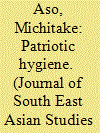

|
|
|
|
|
| Publication |
2013.
|
| Summary/Abstract |
This article examines knowledge production about malaria in colonial and postcolonial Vietnam. During the 1920s and 1930s, medical doctors cooperated with plantation managers in order to develop industrial hygiene techniques consisting of environmental modification and quinine use. By the 1930s, changing motivations, in particular racial hygiene and patriotism, drove malaria control efforts. The wartime pressures to control malaria between the 1940s and 1975 further encouraged patriotic hygiene. This history of malaria science in Vietnam highlights the tension between change and continuity and shows the importance of place in the conjunction of scientific knowledge production and nation-building projects.
|
|
|
|
|
|
|
|
|
|
|
|
|
|
|
|
| 7 |
ID:
085125
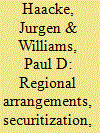

|
|
|
|
|
| Publication |
2008.
|
| Summary/Abstract |
This article seeks to contribute to debates about how regional arrangements construct and respond to threat agendas. It does so by using the literature on the concept of securitization to explore the processes through which the African Union (AU) and the Association of Southeast Asian Nations (ASEAN) have dealt with contemporary transnational challenges. After providing an overview of the Copenhagen School's (CS) understanding of securitization, we examine the main problems and limitations that emerge when attempting to apply the concept of securitization to regional arrangements in the developing world. The article explores in particular the extent to which the AU and ASEAN have securitized the transnational challenges on their agendas. We conclude that in both cases the impact of security culture as well as unresolved conceptual and methodological issues raise significant questions when seeking to apply securitization theory outside of Europe.
|
|
|
|
|
|
|
|
|
|
|
|
|
|
|
|
|
|
|
|
|